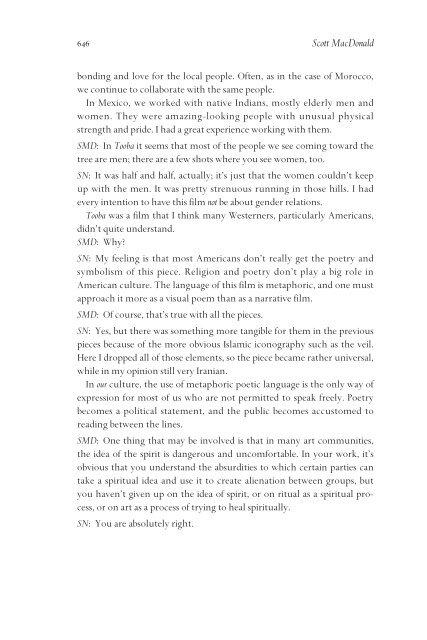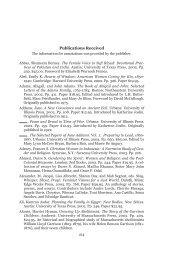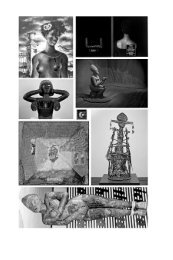An Interview with Shirin Neshat - Feminist Studies
An Interview with Shirin Neshat - Feminist Studies
An Interview with Shirin Neshat - Feminist Studies
Create successful ePaper yourself
Turn your PDF publications into a flip-book with our unique Google optimized e-Paper software.
646 Scott MacDonald<br />
bonding and love for the local people. Often, as in the case of Morocco,<br />
we continue to collaborate <strong>with</strong> the same people.<br />
In Mexico, we worked <strong>with</strong> native Indians, mostly elderly men and<br />
women. They were amazing-looking people <strong>with</strong> unusual physical<br />
strength and pride. I had a great experience working <strong>with</strong> them.<br />
SMD: In Tooba it seems that most of the people we see coming toward the<br />
tree are men; there are a few shots where you see women, too.<br />
SN: It was half and half, actually; it’s just that the women couldn’t keep<br />
up <strong>with</strong> the men. It was pretty strenuous running in those hills. I had<br />
every intention to have this film not be about gender relations.<br />
Tooba was a film that I think many Westerners, particularly Americans,<br />
didn’t quite understand.<br />
SMD: Why?<br />
SN: My feeling is that most Americans don’t really get the poetry and<br />
symbolism of this piece. Religion and poetry don’t play a big role in<br />
American culture. The language of this film is metaphoric, and one must<br />
approach it more as a visual poem than as a narrative film.<br />
SMD: Of course, that’s true <strong>with</strong> all the pieces.<br />
SN: Yes, but there was something more tangible for them in the previous<br />
pieces because of the more obvious Islamic iconography such as the veil.<br />
Here I dropped all of those elements, so the piece became rather universal,<br />
while in my opinion still very Iranian.<br />
In our culture, the use of metaphoric poetic language is the only way of<br />
expression for most of us who are not permitted to speak freely. Poetry<br />
becomes a political statement, and the public becomes accustomed to<br />
reading between the lines.<br />
SMD: One thing that may be involved is that in many art communities,<br />
the idea of the spirit is dangerous and uncomfortable. In your work, it’s<br />
obvious that you understand the absurdities to which certain parties can<br />
take a spiritual idea and use it to create alienation between groups, but<br />
you haven’t given up on the idea of spirit, or on ritual as a spiritual process,<br />
or on art as a process of trying to heal spiritually.<br />
SN: You are absolutely right.




